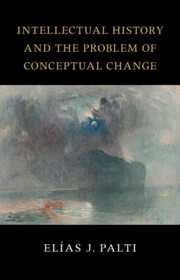Book contents
- Intellectual History and the Problem of Conceptual Change
- The Seeley Lectures
- Intellectual History and the Problem of Conceptual Change
- Copyright page
- Contents
- Preface
- Acknowledgments
- Introduction
- Chapter 1 Pocock, Skinner, and the “Historiographical Revolution”
- Chapter 2 The Republican Genealogy and the Normative Temptation
- Chapter 3 The Problem of Conceptual Change
- Chapter 4 Conceptual History
- Chapter 5 Koselleck’s Begriffsgeschichte
- Chapter 6 Hans Blumenberg and the Theory of Nonconceptuality
- Chapter 7 From Structuralism to Poststructuralism
- Chapter 8 Foucault’s Archaeology of Knowledge
- Chapter 9 The Archaeological Project and the Ignored Epistemic Mutation
- Chapter 10 Behind the Structures and the Subject
- Conclusion
- Epilogue
- Quoted Bibliography
- Index
Chapter 1 - Pocock, Skinner, and the “Historiographical Revolution”
Published online by Cambridge University Press: 02 May 2024
- Intellectual History and the Problem of Conceptual Change
- The Seeley Lectures
- Intellectual History and the Problem of Conceptual Change
- Copyright page
- Contents
- Preface
- Acknowledgments
- Introduction
- Chapter 1 Pocock, Skinner, and the “Historiographical Revolution”
- Chapter 2 The Republican Genealogy and the Normative Temptation
- Chapter 3 The Problem of Conceptual Change
- Chapter 4 Conceptual History
- Chapter 5 Koselleck’s Begriffsgeschichte
- Chapter 6 Hans Blumenberg and the Theory of Nonconceptuality
- Chapter 7 From Structuralism to Poststructuralism
- Chapter 8 Foucault’s Archaeology of Knowledge
- Chapter 9 The Archaeological Project and the Ignored Epistemic Mutation
- Chapter 10 Behind the Structures and the Subject
- Conclusion
- Epilogue
- Quoted Bibliography
- Index
Summary
Chapter 1 analyzes the shift from the history of ideas to the history of political languages, connected with the so-called linguistic turn. Beginning with Lovejoy’s proposal of a history of ideas, which served to establish it as a scholarly discipline, it aims to unravel its fundamental tenets, as well as the rationale behind the focus on “unit-ideas,” derived from the awareness of the problems to categorize different currents of thought in history. It then observes Namier’s critical perspective of that tradition and Skinner’s proposal to stand intellectual history on a new basis. By incorporating the analysis of the performative dimension of language, it overcomes the impasse generated by the shortcomings in the history of ideas and its ahistorical perspective of ideas, thus highlighting the fundamental consequences and its contribution to the control of conceptual anachronisms. This “linguistic turn” allows Skinner to perceive the fallacies or “mythologies” of the history of ideas and recover the notion of the “text” as a meaningful whole. Finally, it analyzes the subsequent “rhetorical turn” in the search to find in the very texts the discursive tracks of their contexts of utterance, and why it meant the dislocation of the antinomy between “texts”–“contexts” and “ideas”–“reality.”
Keywords
- Type
- Chapter
- Information
- Publisher: Cambridge University PressPrint publication year: 2024

